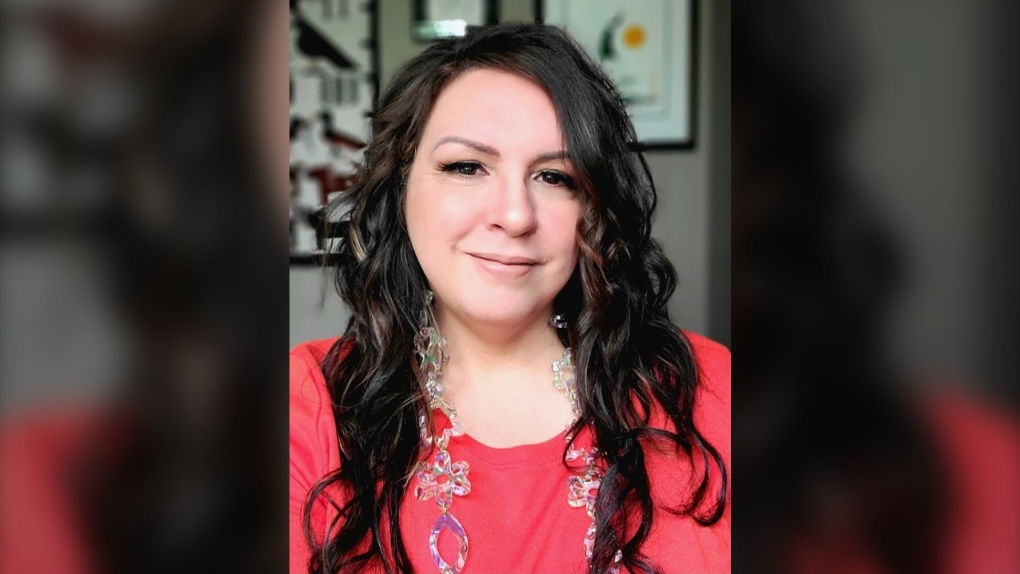Manitoba woman shares her story of reclaiming her traditional Indigenous name
 Katherine Strongwind
Katherine Strongwind
One Manitoba woman is sharing her years-long journey to reclaiming her traditional Indigenous name.
When Sixties Scoop survivor Katherine Strongwind was born in Winnipeg, she was taken from the hospital and placed in a non-Indigenous home. From there, she was given the name of her adoptive family.
“My name was completely changed from my birth name in the adoption. For years, I had that name,” she said in an interview on Friday.
In 2019, Strongwind, who is the director of the 60s Scoop Legacy of Canada, decided to reach out to the provincial government to see if it would pay for her to legally change her name to her traditional Indigenous name.
She was informed that it wasn’t the province’s policy to cover these costs, but she still felt it was the government’s responsibility due to its involvement in the Sixties Scoop.
The Truth and Reconciliation Commission’s Call to Action No. 17 calls for all levels of government to waive fees for five years to enable residential school survivors and their families to reclaim names changed by the residential school system. However, Sixties Scoop survivors covered by this call to action.
“I said, ‘You know, many of those survivors are our parents and our grandparents and had their names changed,’” Strongwind said.
“And even before that when the Indian Act took effect back in the 1800s, many Indigenous people were given English names. So I said, “None of these names are really ours and I’d really like to take my traditional name.”
When she reached back out in 2022, the government agreed to pay most of the costs. Strongwind ended up paying $35 of what would have been $350 for her name change. She received her legal certificate in November 2022.
GETTING HER TRADITIONAL INDIGENOUS NAME
Back in 2015, Strongwind started to look into her biological family’s names. However, she didn’t identify with many of these names as they were Scottish and Irish. She explained that many Indigenous people lost their traditional family names during the fur trade.
“As an Indigenous person I thought I really wanted to have a name that I connected with,” she said.
Strongwind ended up getting her traditional name from an Elder named Charlie Nelson. During a ceremony, she was named Zongwe-Ah-Shiik Kwe, which means strong wind woman. Since the name is difficult to pronounce, she opted to go with Strongwind.
Strongwind, who now lives in British Columbia, said changing her name was about “reclaiming what was rightfully ours from the very beginning,”
“I should have gotten my traditional name when I was a baby and, of course, I never got the opportunity to participate in that,” she said.
She said it was about shedding some of the trauma and the pain that came with adoption.
MANITOBA WAIVING FEES
On Wednesday, the Manitoba government announced it is indefinitely waiving fees for legal name changes to help residential school, Federal Indian Day School and Sixties Scoop survivors reclaim their traditional names.
Strongwind said she was happy to hear this news, and was especially pleased to see that Sixty Scoop survivors were included,
“We know from hearing from survivors that the cost is a barrier,” she said.
“So waiving the cost to have our names changed is a really good step towards reconciliation for some folks.”
Going forward, Strongwind hopes the province continues to make reparations.
“There’s still many, many issues that we’re struggling with,” she said.
CTVNews.ca Top Stories

W5 Investigates A 'ticking time bomb': Inside Syria's toughest prison holding accused high-ranking ISIS members
In the last of a three-part investigation, W5's Avery Haines was given rare access to a Syrian prison, where thousands of accused high-ranking ISIS members are being held.
Trudeau Liberals' two-month GST holiday bill passes the House, off to the Senate
The federal government's five-page piece of legislation to enact Prime Minister Justin Trudeau's promised two-month tax break on a range of consumer goods over the holidays passed in the House of Commons late Thursday.
Irregular sleep patterns may raise risk of heart attack and stroke, study suggests
Sleeping and waking up at different times is associated with an increased risk of heart attack and stroke, even for people who get the recommended amount of sleep, according to new research.
California man who went missing for 25 years found after sister sees his picture in the news
It’s a Thanksgiving miracle for one California family after a man who went missing in 1999 was found 25 years later when his sister saw a photo of him in an online article, authorities said.
As Australia bans social media for children, Quebec is paying close attention
As Australia moves to ban social media for children under 16, Quebec is debating whether to follow suit.
Notre Dame Cathedral: Sneak peak ahead of the reopening
After more than five years of frenetic reconstruction work, Notre Dame Cathedral showed its new self to the world Friday, with rebuilt soaring ceilings and creamy good-as-new stonework erasing somber memories of its devastating fire in 2019.
Canada Post temporarily laying off striking workers, union says
The union representing Canada Post workers says the Crown corporation has been laying off striking employees as the labour action by more than 55,000 workers approaches the two-week mark.
Can't resist Black Friday weekend deals? How to shop while staying within your budget
A budgeting expert says there are a number of ways shoppers can avoid getting enveloped by the sales frenzy and resist spending beyond their means.
Montreal shopping mall playing 'Baby Shark' song to prevent unhoused from loitering
A shopping mall and office complex in downtown Montreal is being criticized for using the popular children's song 'Baby Shark' to discourage unhoused people from loitering in its emergency exit stairwells.


































